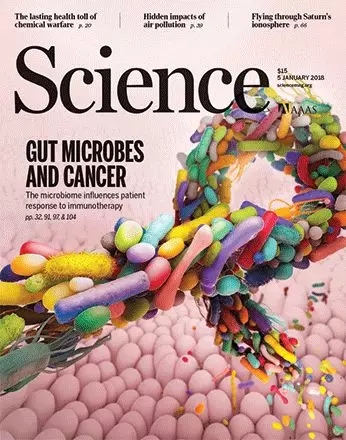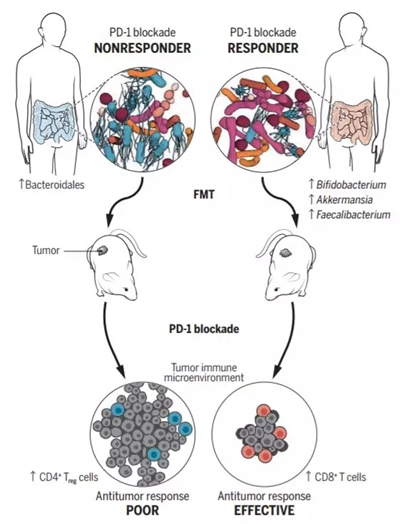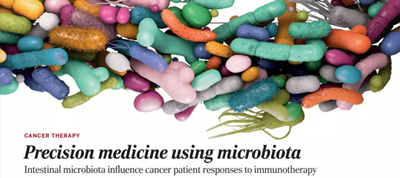Science: Regulation of the microbiome is expected to be an important part of tumor immunotherapy January 05, 2018 Source: Academic Jingwei Today, the latest issue of Science magazine is on the line, "Intestinal flora and cancer" is on the cover. The editors of Science magazine used different intestinal flora to create a "cancer ribbon" to emphasize the importance of these microorganisms for tumor immunotherapy. ▲The cover of the latest issue of Science magazine (Source: V. Altounian / Science) In this issue of Science, three heavyweight studies were published simultaneously. Some of them indicate that patients with a special gut flora have a better prognosis, while others point to a lack of gut microbiops that make immunotherapy ineffective. Therefore, regulation of the microbiome is expected to become an important part of tumor immunotherapy! The first study was from a group of two French professors. Professor Guido Kroemer and Professor Laurence Zitvogel's team found that the intestinal flora played a key role in the effectiveness of immunotherapy. When patients use antibiotics, the effect of anti-PD-1 therapy becomes very poor. By sampling the lung and kidney cancer patients, the researchers found that patients who could not benefit from immunotherapy lacked a bacterium called Akkermansia muciniphila. Subsequently, they demonstrated the benefits of this bacterium using mouse experiments. First, they used a method of fecal transplantation to transplant a population of patients who had been treated with antibiotics (which did not respond to immunotherapy) to patients who had "immunotherapy response" and "immunotherapy did not respond". As the researchers expected, the former restored response to immunotherapy, while the latter remained unresponsive to immunotherapy. More interestingly, if the latter is given oral Akkermansia muciniphila, it can reshape the efficacy of immunotherapy. This study clearly supports the importance of gut microbiota for anti-PD-1 immunotherapy. ▲ mice with different microorganisms react differently to tumor immunotherapy (Source: Science) Two other related papers in this issue of Science focus on melanoma, which is the initial indication for multiple anti-PD-1 immunotherapy. Among them, one study was led by Professor JA Wargo of the MD Anderson Cancer Center, and the other was from the team of Professor Thomas F. Gajewski of the University of Chicago. In the previous study, the researchers analyzed the oral and intestinal flora of 112 patients receiving anti-PD-1 immunotherapy. They found that those who responded to immunotherapy had significantly different composition and diversity of "no response" patients. The stool analysis of 30 "reactive" and 13 "non-responsive" patients showed that the Ruminococcaceae family had higher bacterial abundance in the former. Functional analysis further revealed that the anabolic pathway in the former is more abundant, and the systemic immunity and anti-tumor immunity are also stronger. The latter study has a similar design. Before immunotherapy in patients with metastatic melanoma, the researchers examined their stool samples and analyzed specific strains using 16S ribosomal RNA sequencing, metagenomic sequencing, and quantitative PCR. They found that Bifidobacterium longum, Collinsella aerofaciens, and Enterococcus faecium were more abundant in those who responded. The mice that received these bacteria had better control of the tumor, the T cell response was stronger, and the immunotherapy was better. ▲ Will microbes become a new generation of precision therapy? (Source: Science) In the same period, Science published a review of the article by Professor Christian Jobin of the University of Florida, arguing that using the microbiome, we are expected to bring new precision therapy. As Professor Jobin said, the microbiome is a treasure trove for the next generation of new drugs. Breaking through the path between microbiome and immunotherapy can bring us new insights. Reference materials: [1] Gut microbiome modulates response to anti–PD-1 immunotherapy in melanoma patients [2] The commensal microbiome is associated with anti-PD-1 efficacy in metastatic melanoma patients [3] Gut microbiome influences efficacy of PD-1–based immunotherapy against epithelial tumors [4] Precision medicine using microbiota Two Wattle Pepper,Dry Red Chili Two Wattle Pepper,Long Dry Red Chiliestwo Wattle Pepper,Red Chili Two Wattle Pepper Sichuan Liuhang Agriculture Co.Ltd , https://www.lhagriculture.com


Science: Regulation of the microbiome is expected to be an important part of tumor immunotherapy
